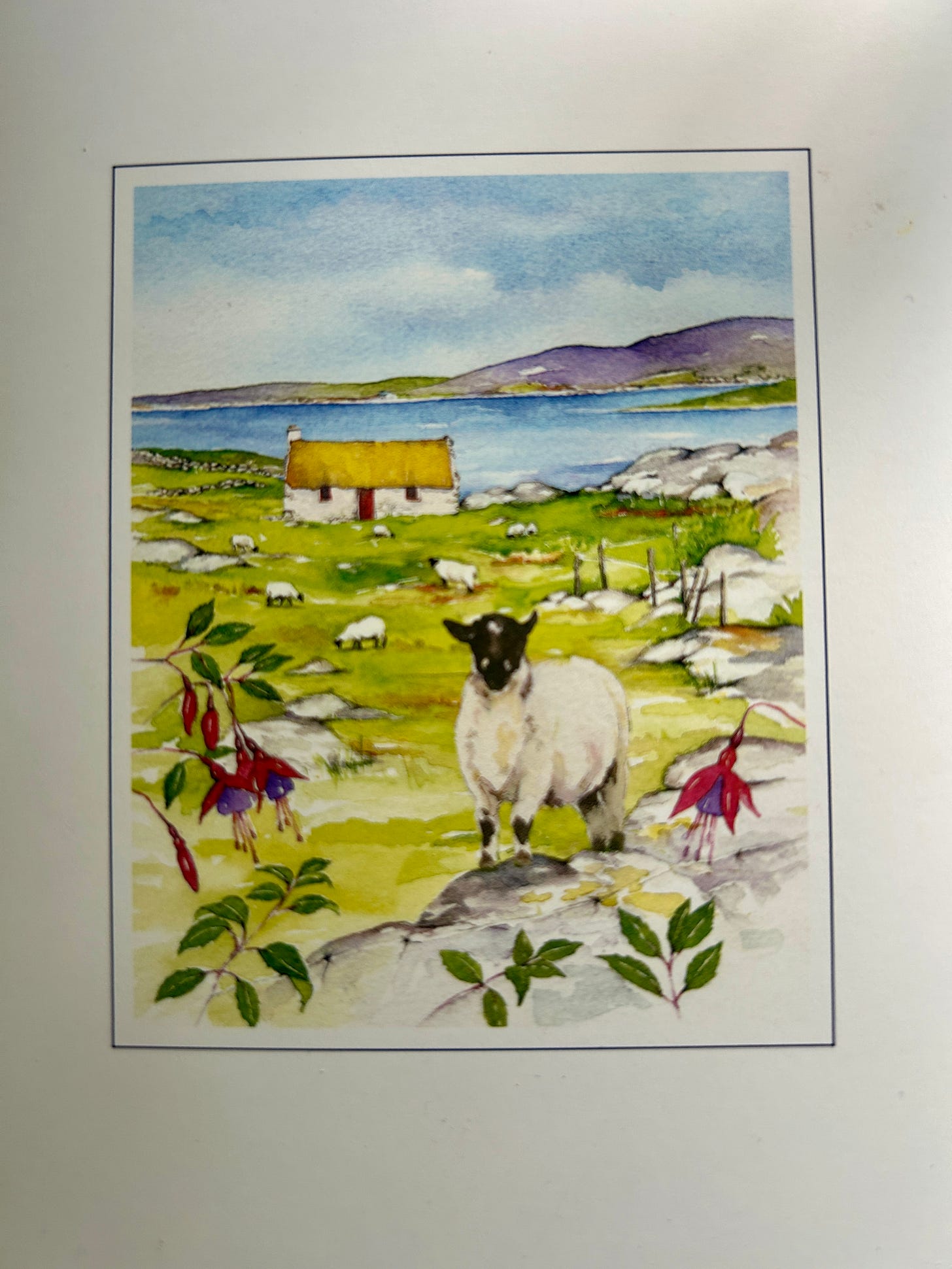
”Oh, you’re a writer?”
Almost every one asks this on my telling them what I do, besides whatever I’m doing at that moment, depending on whether I’m waiting on them at the museum where I work or at the organic market where I also work.
Next question is almost always, “Have I read any of your writing?”
This is the strangest question. How would I know what you’ve read? You just wandered into the museum shop and are buying some postcards or a book or earrings. Or you are buying organic and locally grown spicy greens and the subject came up.
I just get to the point: “I write fiction and I’ve written two books about craft beer.” Sometimes I leave out the beer books, since one is out of print and the second was virtually ignored by my publisher and didn’t do well.
But when I say, “I just got back from a writers’ workshop in Ireland,” people perk up. Something about either writing in Ireland, or the words “writers’ workshop” may elevate my esteem. No idea, because, like I said before, how do I know what people read, or what they think?
But it may be the smile on my face when I say that: “I just got back from a writers’ workshop in Ireland.”
For all the reasons I outlined in Part One of Dabbling in Dingle, the companionship of people doing what you do is priceless. Writing is a solo venture — no one sits by your side when you’re writing, applauding each nuanced use of a comma or a semi-colon or the the use of second person, as in “you go to the pub, and you sit down, and you see the handsome bartender, and you ask for a Dingle Extra Stout….”
No, you are all alone in a room or cafe or airport tapping away on an iPad, or tablet or even hand-writing in your fancy Fabriano notebook with a fountain pen (how I thought that was a good idea, instead of bringing my iPad, is another whole essay), fleshing out characters, if you write fiction, or telling all about your fathers, mothers, or all the others who shaped our worlds. Sometimes we cry.
Above photo: Suzanne Strempek Shea, (Make a Wish, But Not for Money) wonderful teacher and writer, writes along with us in the Gallorus Oratory, holy ground.
So when writers get together, and sit rapt in mini-workshops given by much better-published and better-known writers, (Suzanne Shea and Andre Dubus III, I’m talking to you), we dig into our feelings and senses, plug those into a piece of writing we are assigned on the spot, and off we go.
The very first day, after climbing Carhoo Hill to the Eask Tower Suzanne gives us this prompt:
Above photo: yes, I climbed this mountain without having to have a life-flight bring me home. Yes, I slowed down the entire group and they were kind enough not to roll me back down the hill with the sheep.
****
“What has been your character’s or your “Eask Tower,” showing you safe passage once or many times?”
Here’s what came out of me.
****
Seamus knew Eileen was gone when she didn’t come home by four. She’d have a bag with her, with fish from Tim or a fresh killed chicken, potatoes and carrots from the farmers market. He checked the calendar on the kitchen wall. Aye, tonight would be the chicken, he thought, and the time clicked past, the clock’s second hand seeming louder and louder, until he dozed, hoping she’d return soon.
But alas, the clock chimed the hour, five, and a banging he heard on the stairs and the voice of Tim, which he never heard outside of Sundays when the boat and himself took a day off. Tim burst into the kitchen soaking wet and red-faced.
“She’s nowhere to be found, Da.”
“So what do we do?”
“Get on yer coat & come with me to look some more.” And Tim went to help Seamus, who never struggled before with getting on a coat, but his whole body was trembling and his hands shook — he couldn’t prepare for the worst, even though all the signs pointed to that being the reality.
“ I can’t, Tim.”
“Ye can, Da and ye must. C’mon, it’s gettin’ dark and the rain is still comin’ down.”
“What if we lose her, Tim? What if I lose her?”
Tim pushed his father out the door, down the stairs and past the bakery to the outside. Seamus let the cold air calm him. He hadn’t told Eileen he loved her in ages, but she must know. I do, he thought…she was what kept him going. She kept the boys straight, kept the house, forsook friendships and he didn’t encourage any. He shook off the wet and followed his oldest son up the hill.
“She told Father Burke she was goin’ to Howth Head,” Tim yelled over his shoulder.
“Then that’s where we’ll find her,” Seamus called. And he knew they would find her. He tried not to think whether she’d be dead or alive.
*****
That is how I plugged Suzanne’s prompt, about the tower we sat near as we wrote, into a novel I’m working on called When Irish Eyes are Dying. It may not end up being the cozy mystery novel I once planned, but it doesn’t matter. I got a scene I’d never thought of before that moment, beside the tower that reminds me of root beer-flavored hard candy of the same shape, looking at a lone boat moving across the bay below.
Eask Tower was built in 1847 in order to guide the ships and boats into the mouth of the harbour. The wooden hand pointing from the Tower guides the boats to their destination.
The tower is of solid stone. The building of it on Carhoo (Ceathru) hill, 180 metres (600 ft) above sea level, provided work during the Great Famine, at the instigation of Reverend Charles Gayer, leader of the Protestants, in an attempt to win converts. (Going all in on research here but this is from Wikipedia).
Aside: I have no idea why I can sometimes get a ‘real’ caption to work in this app, and why most times I have to put it in the body of the writing. Apologies to the formatting police.
*****
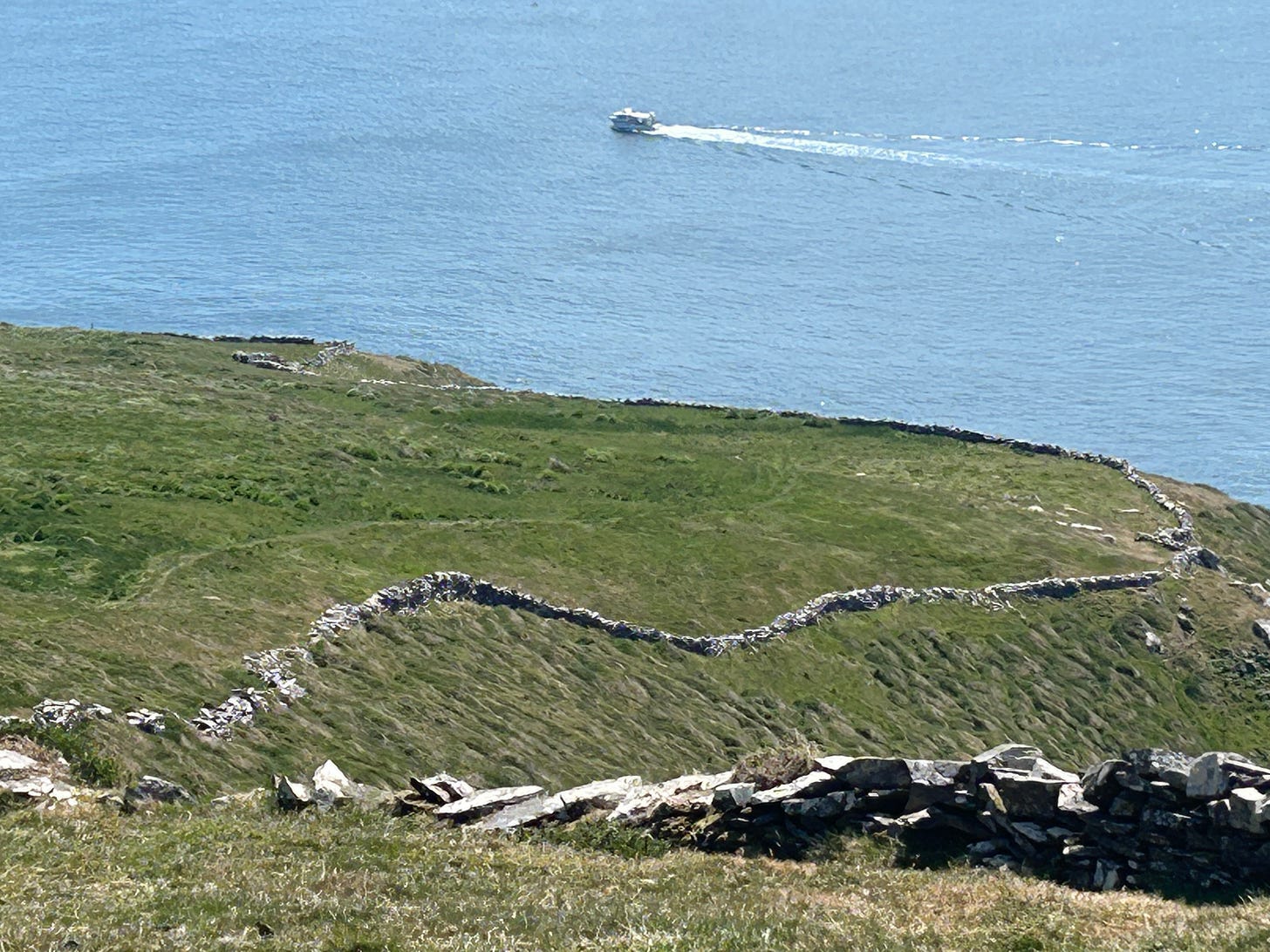
In my second-half workshop with Andre Dubus III (The House of Sand and Fog), he gave us a simple prompt. I thought I’d never come up with anything to go with it….
Above photo: The last day of our workshop with Andre Dubus III….we laughed hard and some of us cried. And we all agreed that what was written and revealed in that haunted room would stay in that room. I say haunted, because without fail, every day, some Irish person wandered into the room, and asked us questions. We swore they were messengers from beyond.
****
Here is what happened in a gloomy room at An Diseart, by the church in Dingle:
Prompt: Drive with me through the town where I grew up:
When I was five or so, my grandparents would pick us up, after dinner, after our bath in our p.j.’s, and drive to the dairy where they made ice cream. Nannie and Bumpie were a dour pair, so ice cream with them was rare, though unquestioned, because to ask, “why me, why tonight, why ice cream,” would burst the bubble.
I sat in the too-big, tree-green Adirondack chair made of wood, in an era before plastics, when grass was grass and dust fell on farmland and not car dealerships and the cone in my little hand was steady, so not to make a mess, me licking without words, this hometown miracle.
***
Right away after writing that I felt like I should replace the word “dour” with perhaps “serious,” but so far I haven’t. Because it’s the first word that occurred to me. But placing my now grandparent self into Nannie and Bumpie back then I realized that “dour” is indeed harsh. When I have my grandkids, I’m so worried that I won’t do a good job of either babysitting them or just bringing them out for yes, ice cream, that I sense that I’m also not smiling. I am dour.
And the circle goes around. Without that prompt, I wouldn’t have delved that deeply into that memory, or my feelings about my mother’s parents. Who were probably taking me (us, really, but I can’t recall who else was with me that night), so my mother could get an hour of sanity by herself back at the house.
Above photo: Andre reads from his new memoir, Ghost Dogs, a most beautiful essay about the first date with his wife Fontaine.
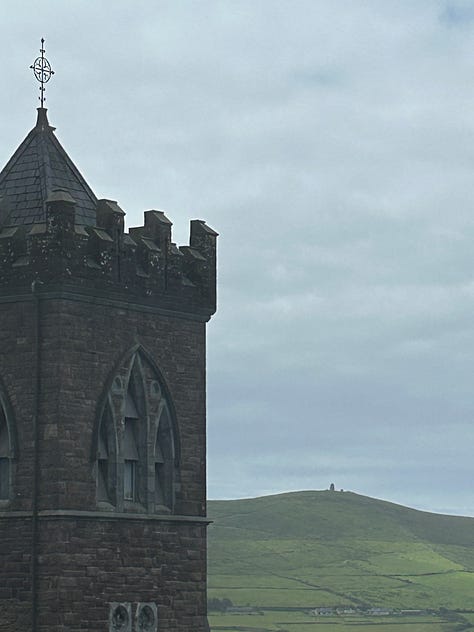
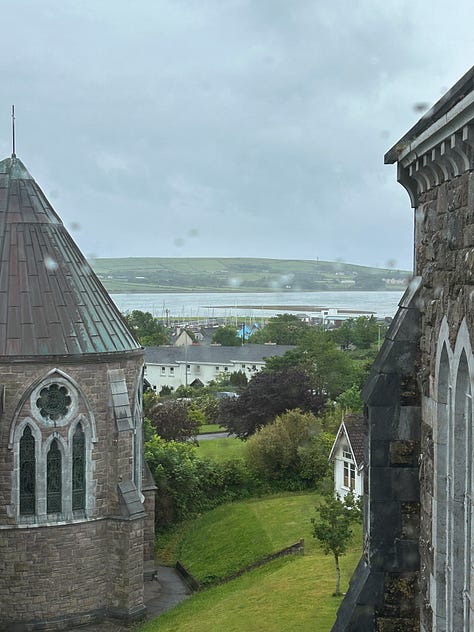
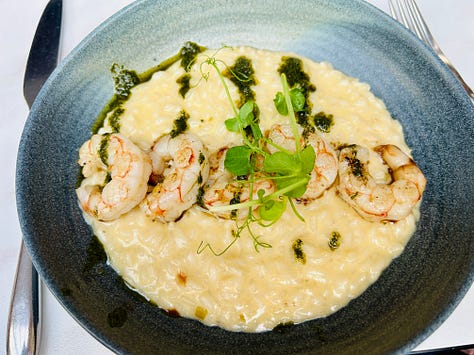
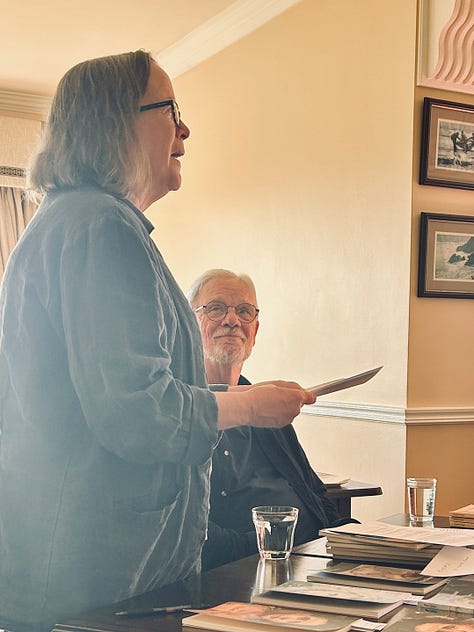
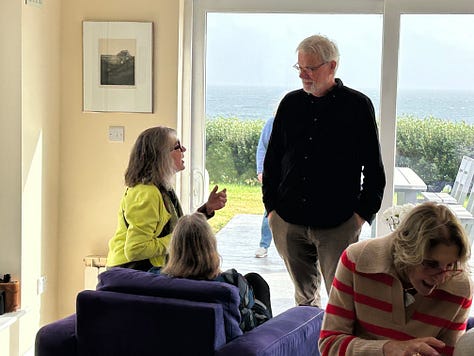

That is a glimpse into a writer’s life. We all post that we miss it, and each other, and that is worth the price of the airfare. Slainte!










"dour" is my new favorite word!
just thought I'd mention that
I'm hooked (love a good story:) So what happened to Eileen?